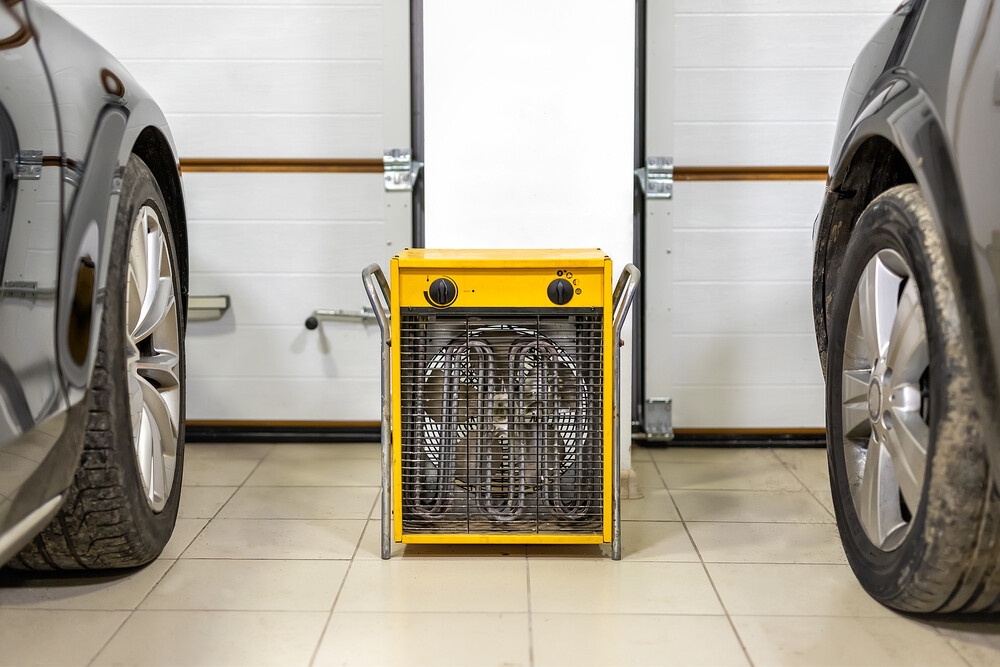Can you believe winter is already around the corner? With Akron already experiencing days in the 50s, it won’t be long before those overnight lows are in the sub-freezing range. And while your house might be nicely heated, is your garage? Have you ever even considered a garage heater?
The fact is, whether our garage is attached or detached, you have many options for heating your space. Of course, you will have to look at the costs involved and the type of garage heater that suits your space, but those are easy considerations. Generally, you have four different types of garage heating options: wood, natural gas, electric, and fuel oil. We are going to take a closer look at each a little later.
Why a Warm Garage Matters
Don’t get caught thinking that a heated garage doesn’t matter. Sure, Northeast Ohio residents know how cold it gets outside, but it is easy to think as long as it is warm in the house, the garage doesn’t matter. That is incorrect. Just because you may not spend a ton of time in your garage doesn’t mean it should be freezing. This is especially true if the garage is your main entry point into the home.
There may also be infrastructure considerations. If there are poorly insulated water pipes running through the garage, they could freeze. Home owners combat this by using a garage heater during the cold winter months. Also consider your electric bill. If your garage is not heated, cold air is getting into your home. It’s a simple fact. And when your home’s heating system works harder because your garage is an ice box, you wind up paying more in the long run.
And if you utilize your garage as a workroom or classroom for your children, obviously it would be unacceptable to let it get freezing cold. By using a garage heater you can get the most out of the space year-round and ensure you and/or your kids remain comfortable.
Top Questions Before You Buy a Garage Heater
You never want to turn investment purchases into impulse buys. It is critical you do your due diligence and ensure you make a choice that is right for your home. First, ask yourself a question of space. How big is your garage? Not all garage heaters are created equally. The last thing you want is a huge heater driving up your bill to heat a small space. Even worse, you don’t want to buy a heater that is inadequate for the job.
Also consider what you use the garage for. Are you mostly storing things? Do you park one or more vehicles in it? If you are not spending a lot of time in the garage, it may be wise to use an inexpensive heating option. All you really need is a comfortable temperature that isn’t enabling cold air to seep into your home. But if you do spend a lot of time in the garage, you should at least consider a mid-range garage heating system.
Another consideration is whether you need an HVAC system. Summers in Akron, Canton and the surrounding areas can be pretty hot and sweltering. You might want a cooling system as well to keep the garage cool and help you control excess humidity. That way if you want to use your garage for human uses, such as an office space, you can be comfortable all year round.
What Should You Use for Your Garage Heater?
Let’s have a look at your options. First up, your classic wood stove. A lot of people who live in remote or rural areas utilize wood stoves as their primary source of heat. Consider a wood stove for a detached garage. Since detached garages are further away from the home, they pose less of a fire risk. Make sure you consider the regulations in your area around what types of wood stoves you can use.
You can also utilize propane or natural gas as your heating option. Adding one to your home is actually easier than you might think. There are direct vent and unvented systems that are not difficult to install. Direct vent systems are the most popular, efficient, and keeps our odors and emissions. This Dyna-Glo Natural Gas heater is great for mid-size garage spaces.
Electric heating systems also offer a variety of options. Whether you need a portable heater for a small space or are looking for something more permanent like a baseboard heater, electric heaters can do the trick. They come in a variety of voltages, as well, making it easy to find one for your space. We like this Fahrenheat electric heater built specifically for garage spaces.
Finally, you could consider simply extending your home’s HVAC system, especially if you have an attached garage. If you already have a central furnace in your home, you might as well save some money and go with the currently installed system.
Keep Your Garage Door in Mind
When you consider that your garage door is essentially another wall of your home, you should take insulating it very seriously. Want to know the best options for insulating your garage door? We’ve got you covered! You want to make sure your garage door is properly insulated. As old man winter approaches, a rickety, worn-out and uninsulated door will do you no favors.
Fortunately, if you are not in the market for a new garage door, you can try a DIY insulation installation method. Unlike other garage door needs, which can be dangerous, installing insulation is not a huge deal. The key is to ensure proper balancing of the door. A properly balanced garage door should stay in place if you lift it half-way and then let it go. However, insulation adds weight to the door, and that may throw off the balance. If your door falls after you let go of it, you may need a technician to come out to readjust the spring tension. Leaving the door in an unbalanced state can damage your garage door opener.
Just keep in mind that no matter what heater you go with, if your garage door is uninsulated and has failing weather stripping, your precious heat is going to slip out into the night. Address your interior and address your garage door; invest in reliable heating systems and your garage will be nice and comfy through the winter!

